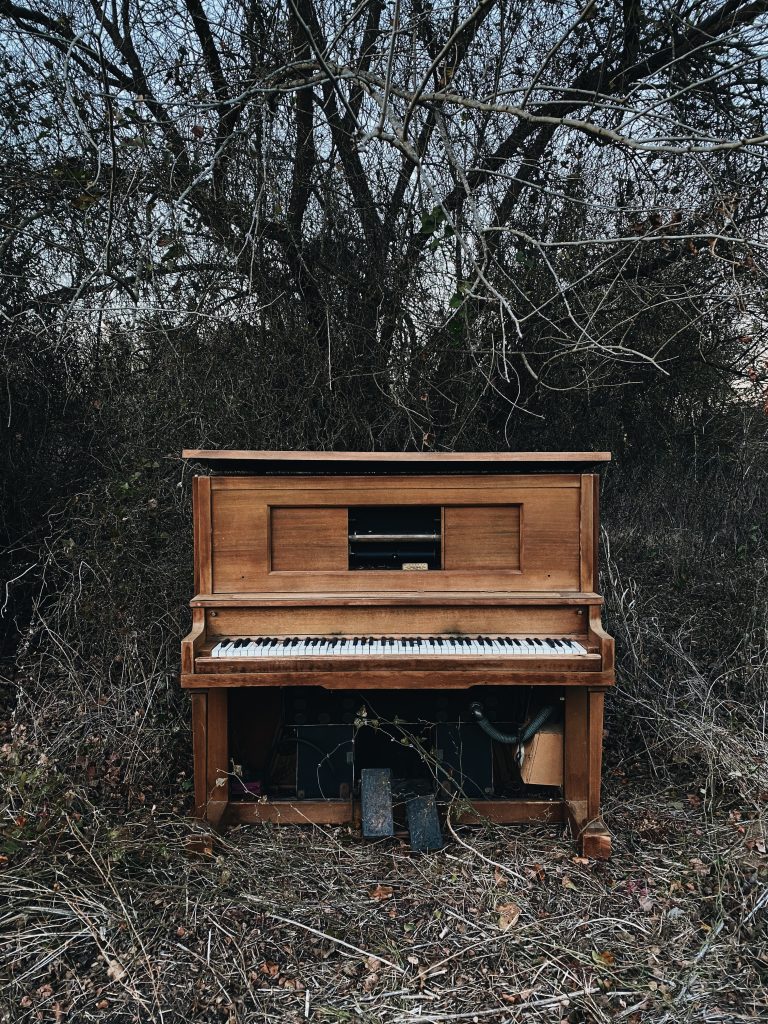A home has a piano. If my mother’s childhood supplied her with a rule she didn’t break, that was it. Her two up two down house made room for an upright. Her mother could bang out any tune by ear. Her father with his Irish tenor voice would head off into song. With his drinking kept to just three half pints, life around him was a genial party.
Mum’s sister had a piano in her Leicester council house, though nobody played.
And Mum had one though nobody played.
Then I played.
This is me, then: I have a picture book of trains, bright images on thick board. A ledge pops down from the piano lid and I set my book upon it. My fingers stretch across the keyboard and I play the book of trains, turning the pages to start a new musical journey. Mum takes me to Loughborough station where we stand on the platform and watch the steam trains power in and then out again; its beating rhythm grows louder on approach and softens with distance. This is the music I hear as I play.
A home has a piano. If my mother’s childhood supplied her with a rule she didn’t break, that was it. Her two up two down house made room for an upright. Her mother could bang out any tune by ear. Her father with his Irish tenor voice would head off into song. With his drinking kept to just three half pints, life around him was a genial party.
On the turntable of my Dansette record player, Dukas’s Sorcerer’s Apprentice spins around. I crank up the volume, settle at the piano and join in. I love the piece but add what it lacks and turn it into a piano concerto.
Four is early to start piano lessons, but I’m eager. My book of trains is replaced by books of musical code and I start to read dots on the lines as music. First the right hand then the left. It’s achingly simple. My ambitions for rhythm are restrained and I produce tunes.
My piano teacher comes to tea and this is the lesson I recall, and it’s one in etiquette: A plate of jam tarts is in the centre. After the first round of people taking the tart they wanted, one desirable strawberry tart is islanded among the yellow of lemon curd. My young piano teacher is my first tea party guest.
‘You must pick first,’ I say.
‘No, after you.’
‘No, after you.’
It’s become a tussle. I think it through and then reach out and take a yellow tart.
The teacher gives me a small smile, and takes the strawberry.
We both chew. Pastry crumbs drop to our tea plates as Mum looks on and beams.
Years later I watch a TV adaptation of Bernard McLaverty’s short story ‘My Dear Palestrina’. For its soundtrack, a soprano sings Schubert’s ‘Du Bist die Ruhe’. There’s no sweeter combination of piano and voice. I read the short story. Both the story and the TV version make me weep gentle tears. Both capture the poignancy of a child’s relationship with a piano teacher.
‘You must have learned the piano as a child,’ I say to Bernard McLaverty when we meet.
It’s not so, he tells me. He doesn’t play the piano.
Here is a fresh wonder, how a writer tunes fiction into truth.
Mrs Towers’ house lies on a road between Loughborough Grammar School and home. It’s a semi-detached from the 1950s that I visit after school on Thursdays, between 4.30 and 5. The piano is in the bay-windowed front room. Sometimes an extra keyboard for the feet is stretched along the carpet, so Mr Towers can practise at home for his role as a church organist. Piano music is kept in a closed oak cabinet. A French carriage clock ticks on the mantelpiece.
Dorothy Towers is my first Arts professional. And other than teachers, she is the first university graduate I come to know. Decades before, she met her husband when they were both students. They have been settled in this house for years. Her skirt is a dusky brown, her blouse a pastel yellow or green, her hair a contained billow of light grey.
A stout girl before me fumbles her way through J.S. Bach’s Invention in F. She bursts from the room, her eyes dulled but wearing the grim smile of release. For decades children have passed through Mrs Towers’ front room in these half-hour pulses. For a break from a lesson of children’s musical fumblings the teacher takes a short turn on the piano stool, her back straight, her hands poised, her fingers arched and then she ripples or hammers across the keys so we can hear how the music might truly sound.
Mr Towers is some shadowy presence deep within the house, but this front room is a refuge where music is enough.
I am not a good student. Discipline bores me. I find no scrap of joy in practising scales. If told how to do something, anything, I immediately seek another way to do it. Mrs Towers’ urgent demand is that I concentrate on my fingering. My fingers run out of space and become entangled. Mrs Towers is not well pleased
‘I want to stop,’ I tell my mother.
‘Practise for half an hour a day,’ Mum says. ‘And go for one more lesson. If you want to stop after that, then you can stop.’
I do my daily practice and improve. I attend my lesson. I settle on the piano stool and play and Mrs Towers listens and becomes happy.
‘Was that it then?’ Mum asks afterwards. ‘You’re never going back?’
‘Why?’ I ask. ‘Why would I do that?’
Mrs Towers marks my piano music in thin lines of pencil. These books become my heirlooms.
We work through the grades, theory and practice, till I reach grade 5. I have some excuse, I forget what, but I fluff the exam and fail. We agreed to let exams be. I can simply come and play.
I offer up a Chopin Nocturne. The final notes fade and I pull my fingers from the keys. I expect some reaction. Mrs Towers is not mean with praise, but there’s silence. I turn toward her. She pulls a dainty handkerchief from her sleeve and dabs her eyes. It takes her a while to speak. ‘I’m sorry,’ she says. ‘This hardly ever happens. But that was very moving. You played it perfectly.’
We put J. S. Bach aside. It feels mechanical and isn’t working for me. ‘Don’t worry,’ Mrs Towers says. ‘It can take a while to appreciate Bach. You will love him when you’re older.’

Decades pass and I sit in the concert hall of St Luke’s for a short Bach programme by the young Icelandic pianist Vikingur Olafsson. His right hand plays an unadorned motif that cracks me wide open. The is the Fantasia in C. The fugue picks up the theme and opens it out, layer by layer, broader and broader, and I am quaking. The concert closes and I step out to sit among the tombs in the graveyard outside and weep. I manage to come back for the next concert in the programme where middle aged eccentrics are playing Bach on moog synthesizers. It violates the space the piano has set me inside and so I walk back to the graveyard where I continue to weep. The Bach piano fugue has turned me inside out, inverted me. What was hidden is now on the outside.
The music will haunt me for weeks and then for months tears will flow at the memory.




